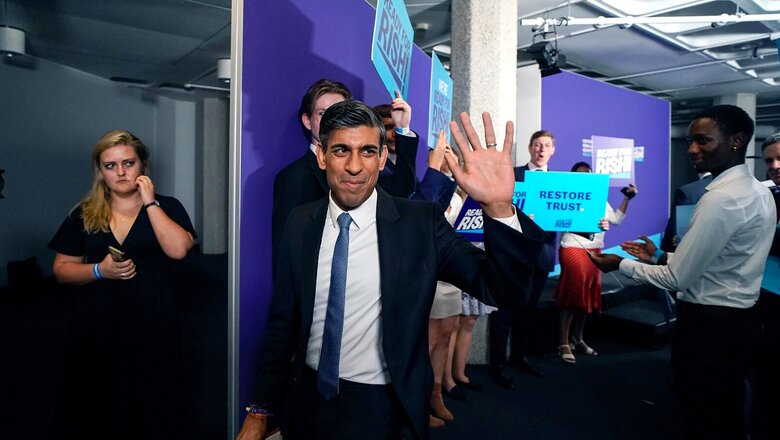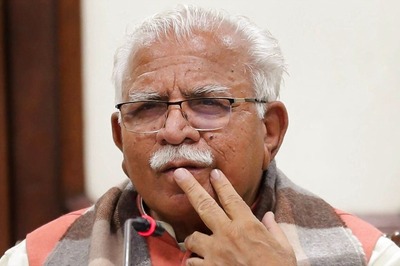
views
The last two weeks in Britain have witnessed the unfolding of an unprecedented political crisis. British Prime Minister Boris Johnson finally resigned and the chain of events suggests that Johnson was actually pushed out of office. Today, the UK is caught in the middle of a leadership crisis amidst soaring inflation, a cost-of-living crisis and the Russia-Ukraine war.
Yet, the high-voltage political drama that gripped the UK over the last two weeks shows that irreparable damage has probably been done to the democratic institutions in the island country and public confidence over the democratic setup is at an all-time low. But how did the UK land here in the first place?
Indian analysts, too, seem to be covering the political crisis in the UK closely. There is an exaggerated sense of jubilation on display over the prospect of a man of Indian origin, Rishi Sunak, succeeding Boris Johnson as the British Prime Minister. However, the latest survey suggests that Sunak is now behind Liz Truss in the race to the 10 Downing Street.
The coverage in India relates to the compulsive obsession with people of Indian origin making it big in foreign corporations or the governments of other countries. So, the narrative seems to suggest that the ongoing political crisis in the UK is actually going to yield some positive results for India. But this brings us to the bigger question: Does a man of Indian origin in the top office necessarily imply a pro-India outlook?
A series of scandals and the loss of faith
When Boris Johnson returned to power with a landslide victory in December 2019 and the Jeremy Corbyn-led Labour got decimated, it seemed that the Conservatives and Boris Johnson would easily dominate UK politics over the next five years. However, a series of scandals rocked the Johnson government which ultimately left the British Prime Minister abandoned. This now seems to be eroding faith in British democracy.
It all started with the “partygate”. The scandal is a reference to parties held by Boris Johnson government officials in stark violation of the Covid-19 lockdown norms last year. Some of these parties were held in Johnson’s own Downing Street office itself. A senior civil servant even prepared a report that detailed unpleasant events of staff’s excessive drinking and vomiting. And things went particularly awry because Johnson himself got fined for attending a birthday party in violation of the lockdown rules.
It is in the context of such controversies that Britons tend to be losing faith over British democracy. A recent report by the IPPR thinktank, in collaboration with the Observer, revealed that young adults in the country are showing a dramatic loss of faith in the country’s democracy. Only 6 percent of the voters interviewed in the survey believed that their views drive government decisions and policies. Most of them believed that major donors, business groups, lobbyists, and media groups drive government decisions.
On top of it, even more scandals have been disclosed after the partygate. Days before Johnson’s resignation, his government was hit by the Chris Pincher scandal. Chris Pincher, a Conservative lawmaker, was accused of groping two men at a London club in 2019. He had to step down as a government whip over these allegations on June 30. On his part, Johnson was accused of not acting against Pincher when the sexual misconduct allegations surfaced in 2019.
To make things worse, the Johnson government set up a flimsy defence on the Chris Pincher scandal. On 1 July, the government claimed that Johnson was not aware of the charges but only days later, a spokesperson said that the British Prime Minister knew of the sexual misconduct allegations.
The crisis
The scandals ultimately led to a full-blown crisis in the Boris Johnson government. Two of his senior-most Ministers, Rishi Sunak and Sajid Javid, tendered their resignations in quick succession to each other. Both of them expressed lack of confidence in Boris Johnson’s leadership and their resignations soon triggered a rebellion of sorts.
Five cabinet ministers in the Johnson government resigned, another one got sacked, two of them advised Johnson to give up and over 50 junior ministers and lower-level officials also resigned. The entire episode scripted a disgraceful exit from power for the British Prime Minister. It seemed as if Johnson was interested in serving for a full tenure of five years. However, he was taken aback by mass resignations in the government and was really left with no option but to give up. This, of course, reveals how manipulations and machinations have taken hold of British democracy.
Understanding the obsession with Rishi Sunak
The obsession with people of Indian origin making it big outside India is well-known. You can easily find social media posts, YouTube content and blogs obsessing with people of Indian origin who find success in the Western world. This is somehow projected as a sign of Indian soft power.
However, the false sense of satisfaction on seeing familiar names, surnames and skin colours is actually quite misplaced. Make no mistake, the UK is passing through a state of political crisis. India should be pinning its hope on a leader who can ensure stability in the progress that the Indo-British relationship has already made instead of believing that a leader of Indian origin will necessarily pursue a pro-India outlook.
Remember, there are other leaders of Indian origin in the Western world. Kamala Harris, the US Vice President, too is a woman of Indian origin. However, we have rarely seen any friendly overtures from her side. In fact, such leaders have to cater to a domestic audience that often tends to be infested with racial sentiment. Rishi Sunak is no exception.
Even if he makes it to the top office, his distant Indian background shouldn’t be necessarily perceived as a good sign for India’s relationship with the UK. After Boris Johnson’s unpleasant resignation, the UK is facing a stiff challenge to its democratic ethos and we should therefore wait for its return to stability instead of getting carried away by emotions and relying solely on the prospect of an Indian-origin leader.
Akshay Narang is a columnist who writes about international affairs and developments in the defence sector. The views expressed in this article are those of the author and do not represent the stand of this publication.
Read all the Latest News and Breaking News here




















Comments
0 comment